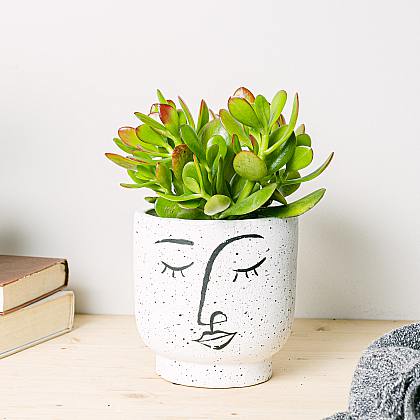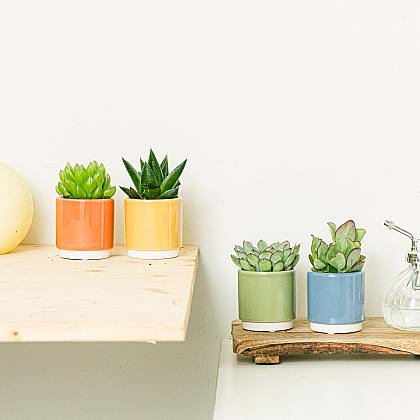The Best Plants for Your Workspace
Are you looking to improve your workspace and boost your productivity? Adding plants to your office environment could be the solution
The importance of plants in your workspace
Plants can have a significant impact on your workspace and overall wellbeing. Research has shown that introducing plants into your office environment can help reduce stress, increase productivity and creativity, and even improve air quality. They also add a touch of nature to your workspace, which can help create a more relaxed and comfortable atmosphere. Plants not only provide visual appeal but also have a calming effect on the mind, which can be beneficial for those who work in high-pressure environments. They also absorb harmful toxins from the air, making it cleaner and healthier to breathe. Some low-maintenance indoor plants that thrive in office environments include spider plants, peace lilies, snake plants, and pothos. These plants are easy to care for and can tolerate low light levels, making them perfect for windowless offices. It's essential to choose plants that suit your office environment and lighting conditions. Additionally, caring for office plants requires regular watering and fertilization, along with occasional pruning and repotting. In conclusion, incorporating plants into your workspace is an easy and effective way to enhance your overall work experience. Not only do they provide numerous health benefits, but they also add aesthetic value to your workspace while promoting a relaxed and calm atmosphere.
Low-maintenance plants that thrive indoors
Low-maintenance plants are the perfect choice for those who want to bring some greenery into their workspace without spending too much time taking care of them. Some of the best low-maintenance indoor plants include succulents, snake plants, and ZZ plants. Succulents come in a variety of shapes and sizes and require very little water or attention. They thrive in bright light and can add a pop of color to any desk or shelf. Snake plants are also easy to care for and can tolerate a range of light conditions, making them ideal for offices with limited natural light. They are also known for their air-purifying qualities, which can help improve the overall air quality in your workspace. ZZ plants are another great low-maintenance option that can tolerate low light levels and irregular watering schedules. They have glossy leaves and can add a touch of elegance to any office space. In general, low-maintenance plants tend to be hardy and adaptable, making them a great choice for busy professionals who don't have time to fuss over their plants. With just a little bit of attention and care, these plants can thrive indoors and help create a more peaceful and productive workspace.
Plants that improve air quality and reduce stress
Plants not only add beauty to your workspace, but they can also improve the air quality and reduce stress levels. Indoor plants have the ability to purify the air by absorbing toxins and releasing oxygen, creating a healthier environment for you to work in. Some plants, such as the snake plant and peace lily, are known for their air-purifying properties and are perfect choices for your office. These low-maintenance plants require minimal care and can thrive in various lighting conditions, making them ideal for busy professionals. In addition to improving air quality, plants can also help reduce stress and promote a sense of calmness. Studies have shown that being around nature, even in the form of indoor plants, can have a positive impact on mental well-being and productivity. Plants like lavender and jasmine are known for their relaxing properties, while others like Aloe Vera and bamboo palm can help create a soothing atmosphere. By incorporating these stress-reducing plants into your workspace, you can create a more pleasant and tranquil environment that enhances focus and productivity. So, why not consider adding some greenery to your desk?
Adding a touch of greenery to your desk
Adding a touch of greenery to your desk is a simple and effective way to enhance your workspace. Not only does it bring a pop of colour and beauty, but it also has numerous benefits for your well-being and productivity. By incorporating plants into your desk setup, you can create a more calming and inviting environment. Consider choosing small potted plants like succulents or cacti that require minimal care and can thrive in indoor conditions. These low-maintenance plants are perfect for busy professionals who may not have the time or expertise to tend to more demanding species. In addition to aesthetics, certain plants have the ability to improve air quality and reduce stress levels. Plants such as spider plants, peace lilies, and snake plants are known for their air-purifying qualities, helping to create a healthier and more enjoyable work atmosphere. Furthermore, studies have shown that having plants in your workspace can promote focus and concentration, leading to increased productivity. When selecting plants for your desk, consider the lighting conditions and temperature of your office environment. Some plants require more sunlight, while others thrive in low-light settings. Lastly, remember to water your office plants regularly and provide them with the necessary nutrients to keep them healthy. Adding a touch of greenery to your desk not only adds visual appeal but also contributes to a more vibrant and productive workspace.
Plants that promote focus and concentration
Plants not only enhance the aesthetics of your workspace but also boost your productivity and concentration levels. When it comes to choosing plants that promote focus, succulents are a great option. These low-maintenance plants require minimal watering and can thrive in dry environments, making them perfect for busy offices. Another plant that promotes focus is the snake plant. It purifies the air by removing toxins and releases oxygen, which helps improve brain function and concentration. The spider plant is another excellent option as it is known for its ability to remove harmful pollutants from the air, creating a clean and healthy environment for you to work in. Adding a peace lily to your workspace can also help improve concentration levels. This plant not only purifies the air but also reduces stress levels, making it an ideal choice for high-pressure work environments. Lastly, the bamboo palm is a great option for promoting focus and concentration as it adds moisture to the air while removing harmful toxins such as benzene and formaldehyde. Choosing any of these plants will not only create a calming atmosphere in your workspace but also help you stay focused and productive throughout the day. Remember to place them in areas with sufficient sunlight and water them regularly to ensure they thrive.
Choosing plants that suit your office environment
When it comes to choosing plants for your office, it's important to consider the environment they will be in. Different plants have different needs, and some may not thrive in certain conditions. For example, if your office has low light levels, you'll need to choose plants that can survive without direct sunlight. Some good options for low-light environments include snake plants, pothos, and ZZ plants. On the other hand, if your office gets a lot of natural light, you'll need to choose plants that can handle the extra heat and UV exposure. Succulents and cacti are great choices for sunny offices. Another factor to consider is humidity. If your office is dry, you may want to choose plants that can tolerate low humidity levels, such as spider plants or peace lilies. If your office is humid, you'll need to choose plants that can handle the moisture, such as ferns or palms. Additionally, it's important to consider the size of your office and the space available for plants. You don't want to overcrowd your workspace with large plants that take up too much room. Instead, opt for smaller plants that can fit on your desk or bookshelf. By choosing plants that suit your office environment, you'll be able to create a thriving indoor garden that adds beauty and health benefits to your workspace.
Tips for caring for your office plants
Tips for caring for your office plants:1. Watering: Ensure that you water your office plants regularly, but be careful not to overwater them. Most indoor plants thrive in slightly moist soil, so check the moisture level before watering. Stick your finger about an inch into the soil, and if it feels dry, it's time to water. Avoid letting the plants sit in standing water, as this can lead to root rot.
2. Light requirements: Different plants have varying light requirements, so it's important to place them in suitable locations. Some plants prefer bright, indirect light, while others can tolerate low light conditions. Observe how much natural light your workspace receives and choose plants accordingly. If needed, supplement with artificial light sources like desk lamps or fluorescent lights.
3. Pruning and grooming: Regularly prune your office plants to promote healthy growth and maintain their shape. Remove any dead or yellowing leaves, as they can attract pests or indicate a lack of proper care. Grooming also involves dusting the leaves to keep them clean and allow for better photosynthesis.
4. Fertilizing: Indoor plants may require occasional fertilization to replenish nutrients in their soil. Use a balanced liquid fertilizer specifically formulated for houseplants and follow the instructions on the packaging. Over-fertilizing can harm the plants, so it's best to err on the side of caution and apply fertilizer sparingly.
5. Pest control: Keep an eye out for common pests like spider mites, mealybugs, or fungus gnats that can infest indoor plants. Regularly inspect the leaves and stems for any signs of pest activity, such as webbing or sticky residue. Treat infestations promptly with organic or chemical pest control methods to prevent further damage.
By following these simple tips, you can ensure that your office plants thrive and contribute positively to your workspace environment. Remember to adapt these care practices based on the specific needs of your chosen plant species.
So there you have it - a guide to the best plants for your workspace. By now, you should understand the importance of having plants in your office, both for their aesthetic appeal and their numerous benefits. From low-maintenance plants that thrive indoors to those that improve air quality and reduce stress, there are plenty of options to choose from. Adding a touch of greenery to your desk can bring a sense of calm and tranquility to your work environment, while certain plants can even promote focus and concentration. However, it's crucial to consider the specific needs of your office environment when selecting plants, as not all varieties will thrive in every setting. Lastly, remember that caring for your office plants is essential to ensure their longevity and continued benefits. Watering, pruning, and providing adequate sunlight are just some of the tasks involved in maintaining healthy plants. So why not give it a try? Incorporating plants into your workspace can make a world of difference. And who knows, it might just inspire you to explore the wonders of nature beyond the confines of your office walls


